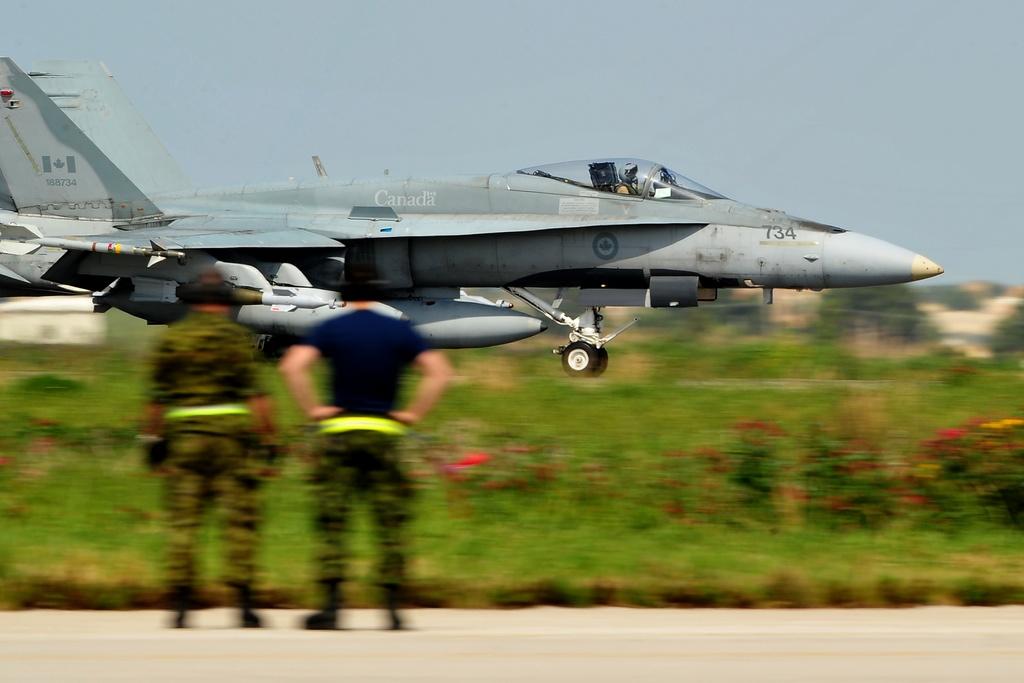NATO’s complicated mission in Libya
A Canadian F18 jet fighter from the 425 Tactical Fighter squadron lands upon arrival from a mission at Trapani-Birgi airbase in Sicily.
BRUSSELS, Belgium — The stated NATO mission in Libya is emphatic: "Protect civilians and civilian-populated areas under threat of attack … . Nothing more, nothing less.”
But the U.N. Security Council’s resolution is being interpreted in many different ways: The alliance will do “nothing more” than what? Against whom?
With 40 governments gathering in Britain today — including NATO member countries and representatives from the Arab world — NATO was hoping the meeting might produce some guidance.
The representatives at the conference reiterated that Libyan leader Muammar Gaddafi must step down and created an “international contact group” to steer political contact and development. Qatar accepted the lead on the project and will convene a meeting as soon as possible.
In a statement following the meeting, NATO Secretary General Anders Fogh Rasmussen welcomed the establishment of the contact group as a “strong expression of international community support for the Libyan people’s wish for freedom, democracy and human rights. ” He also noted that some partner countries “have already indicated that they wish to participate in our operation off the coast and in the air above Libya.”
The fact that the NATO chief spelled out “off the coast” and “in the air” is a warning bell that the potential ground operations against advancing government troops may at some point cleave the cooperation, even though, as Rasmussen says, the alliance has “tried-and-tested arrangements for ensuring that these partners are fully involved in the decision-shaping.”
NATO has emphasized it won’t take sides in the conflict and support any particular rebel group, even as world leaders, including British Prime Minister David Cameron and U.S. Secretary of State Hillary Clinton, met with members of the Benghazi-based National Transitional Council in London.
French President Nicolas Sarkozy weeks ago anointed this group as the interlocutor between the European Union and new leaders emerging in Libya. NATO said it would not arm Libya’s rebels and rejected the notion that it is taking the side of the rebellion in the conflict.
But while NATO declines to speculate on what might happen on the ground militarily in coming days, others are emphatic that a larger international intervention is needed.
Asked about whether or not the allies would help arm the Libyan opposition forces, Clinton said the American interpretation of the Security Council resolution is that it “amended or overrode the absolute prohibition of arms to anyone in Libya so that there could be legitimate transfer of arms if a country were to choose to do that,” she said. “We have not made that decision at this time.”
Further complicating any decision to arm the rebels are concerns that among the opposition are elements of Al Qaeda and other militant forces.
“At this point I don't have details sufficient to say there is a significant Al Qaeda presence or any other terrorist presence,” NATO's Supreme Allied Commander for Europe, James Stavridis, told lawmakers on Capitol Hill on Tuesday. “We are examining very closely the content, composition, the personalities, who are the leaders of these opposition forces.”
Stavridis also said he thought there might be a need for ground troops to stave off Gaddafi advances in Libya, though there has been no formal discussion of such an escalation among the allies so far. U.S. President Barack Obama, for his part, has said he would not be contributing ground toops to the cause.
A NATO military official speaking on background in Brussels also rejected that notion. “No boots on the ground,” he insisted.
A week ago, NATO rejected command-and-control of military operations that involved any direct attacks on government forces, even they were targeting civilians. But after a week of negotiations, NATO agreed to take over command of the Libyan intervention.
The full transition of leadership from the allies to NATO is expected to be completed on Wednesday.
